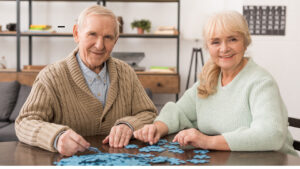Recognizing the Early Signs of Dementia and Alzheimer’s Disease
Are you worried about your loved one’s memory? Have you noticed them struggling to remember simple things or getting confused easily? Recognizing the early signs of dementia and Alzheimer’s disease is crucial for their well-being.
By understanding the difference between dementia and Alzheimer’s, identifying common early symptoms, and seeking professional assessment, you can take essential steps toward support and care. Let’s explore how you can recognize these signs and provide the help they need.
Understanding the Difference: Dementia Vs. Alzheimer’s
To understand the difference between dementia and Alzheimer’s, you need to know that dementia is a broad term encompassing various cognitive impairments. At the same time, Alzheimer’s refers explicitly to a progressive brain disorder.
Dementia isn’t a specific disease but rather a syndrome that affects memory, thinking, behaviour, and the ability to perform everyday activities. It’s caused by various conditions, including Alzheimer’s disease, vascular dementia, and Lewy body dementia.
Alzheimer’s disease, on the other hand, is the most common cause of dementia, accounting for 60-80% of cases. It’s characterized by the accumulation of amyloid plaques and tau tangles in the brain, leading to the gradual decline of cognitive function.
Understanding this distinction is crucial for dementia research and the development of effective treatments. By focusing on the specific mechanisms and characteristics of Alzheimer’s, researchers can work towards finding targeted therapies and interventions that can slow down the progression of the disease and improve the quality of life for individuals affected by it.
Common Early Symptoms of Dementia and Alzheimer’s
Recognizing the early signs of dementia and Alzheimer’s can be crucial in seeking timely medical intervention and support. Memory loss is one of the common early symptoms of both conditions. You may notice that you or your loved one frequently forgets important information, such as appointments, names, or recent events. Difficulty in remembering recently learned information and relying heavily on memory aids, such as notes or electronic reminders, may also be indicative of early-stage dementia or Alzheimer’s.
Additionally, confusion and disorientation are often present in the early stages. You might observe that you or your loved one becomes disoriented in familiar places or struggles to follow directions. They may have difficulty with problem-solving and planning tasks, making it challenging to complete everyday activities.
If you notice these symptoms, you must consult a healthcare professional for a proper diagnosis and explore available treatments and support options. Remember, early intervention can make a significant difference in managing the condition effectively.

Recognizing Cognitive Decline in Loved Ones
Pay close attention to the changes in your loved one’s cognitive abilities. Being able to recognize cognitive decline in your loved one is crucial in providing them with the support and care they need. Here are some signs to look out for:
- Memory loss: Frequent forgetfulness and difficulty recalling recent events or conversations.
- Language difficulties: Trouble finding the right words, struggling to follow or initiate conversations.
- Impaired judgment: Making poor decisions, exhibiting poor judgment in daily tasks.
- Disorientation: Getting lost in familiar places, confusion about time and location.
To effectively communicate with your loved one, consider the following strategies:
- Use simple language and short sentences.
- Offer reassurance and patience.
- Maintain a calm and supportive environment.
Coping with caregiver stress is essential for your well-being. Seek support from family, friends, or support groups, and take breaks to practice self-care. Remember, you aren’t alone in this journey.
Seeking Professional Assessment and Diagnosis
If you suspect that your loved one may be experiencing early signs of dementia or Alzheimer’s disease, it’s essential to seek a professional assessment and diagnosis. Professional intervention is crucial to accurately identify the underlying cause of their symptoms and provide appropriate treatment and support.
A medical evaluation by a qualified healthcare professional is essential for a comprehensive assessment. They’ll conduct a thorough examination, including a detailed medical history, physical examination, and cognitive tests. They may also order additional tests, such as blood work or brain imaging, to rule out other potential causes and confirm the diagnosis.
Taking Steps for Support and Care
Once you have obtained a professional assessment and diagnosis for your loved one’s early signs of dementia or Alzheimer’s disease, it’s time to take the necessary steps for support and care. This can be a challenging and emotional journey, but remember you aren’t alone.
There are support groups available that can provide guidance, understanding, and a sense of belonging. These groups allow you to connect with others who are going through similar experiences, sharing advice and coping strategies.
Additionally, depending on the severity of the condition, it may be necessary to explore long-term care options, such as assisted living facilities or nursing homes. Researching and visiting different facilities is essential to ensure the best fit for your loved one’s needs.
Remember to take care of yourself throughout this process, as your well-being is equally important.
Frequently Asked Questions
What Are the Risk Factors for Developing Dementia or Alzheimer’s Disease?
To prevent dementia or Alzheimer’s disease, it’s essential to understand the risk factors. Genetic predisposition can increase your chances, but there are preventive measures you can take, like staying mentally and physically active, eating a healthy diet, and managing chronic conditions.
Are There Any Specific Lifestyle Changes That Can Help Prevent Dementia or Alzheimer’s Disease?
To prevent dementia and Alzheimer’s disease, making specific lifestyle changes can be helpful. Taking care of your physical health, staying mentally active, maintaining a balanced diet, and staying socially engaged are all important steps to consider.
Can Medications or Treatments Slow Down the Progression of Dementia or Alzheimer’s Disease?
Medications can help slow down the progression of dementia and Alzheimer’s disease, but their effectiveness varies. Alternative treatments like cognitive stimulation therapy and music therapy may also be beneficial in managing symptoms.
How Can Caregivers Effectively Communicate and Connect With Individuals who have Dementia or Alzheimer’s Disease?
To effectively communicate and build connections with individuals suffering from dementia or Alzheimer’s disease, use clear and straightforward language, maintain eye contact, listen actively, and show empathy. These strategies can help create a sense of understanding and connection between you and the person you are caring for.
What Are Some Resources or Support Groups Available for Individuals and Families Affected by Dementia or Alzheimer’s Disease?
There are various resources and support groups available to help individuals and families affected by dementia or Alzheimer’s disease. One example is the Alzheimer’s Association, which offers information, support, and connections to others going through similar experiences.











